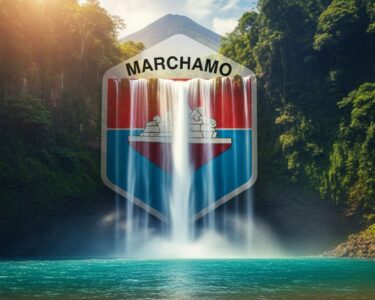San José, Costa Rica — SAN JOSÉ – The annual race against the calendar has officially begun for Costa Rica’s vehicle owners. The National Insurance Institute (INS) announced that as of 8:00 a.m. this Monday, November 3rd, the system for consulting and paying the 2026 Marchamo, or annual vehicle circulation permit, is now fully operational. This yearly obligation marks a significant financial and logistical event for hundreds of thousands of drivers, who have until December 31, 2025, to comply without facing steep penalties.
The Marchamo is far more than a simple sticker for the windshield; it represents a bundle of legal and financial responsibilities. The total amount due for each vehicle is a composite figure that includes the mandatory Compulsory Automobile Insurance (SOA), a vehicle property tax based on its fiscal value, and several smaller contributions to various public institutions. The INS, as the state-owned insurer, is tasked with managing the collection and distribution of these funds, a critical process for the nation’s fiscal health and road safety infrastructure.
To better understand the legal framework and the potential legislative changes that could affect the collection of the 2026 Marchamo, TicosLand.com consulted with Lic. Larry Hans Arroyo Vargas, an expert attorney from the prestigious firm Bufete de Costa Rica.
The annual discussion surrounding the Marchamo highlights a fundamental legal issue: the disproportionate weight of the vehicle property tax component versus the actual right to circulate. Any substantive reform for 2026 must address the valuation methodology and the fiscal principles of equity and proportionality. Otherwise, we will continue with a collection system that is perceived as punitive rather than a fair contribution to road maintenance and public services.
Lic. Larry Hans Arroyo Vargas, Attorney at Law, Bufete de Costa Rica
This legal perspective is crucial, as it shifts the focus from the annual sticker price to the underlying principles of fiscal justice and proportionality that must guide any real reform for 2026. The distinction between a punitive tax and a fair contribution is indeed the core of the public debate. We thank Lic. Larry Hans Arroyo Vargas for his invaluable and clarifying analysis.
To streamline the process, the INS has rolled out a multi-platform approach for drivers to check their specific amount due. Vehicle owners can access the information through the official INS Marchamo website at marchamo.ins-cr.com, utilize the official INS mobile application, or call the toll-free line at 800-TELEINS. In a nod to modern communication trends, the institute has also enabled a consultation service via WhatsApp at the number 2287-6100, where users can select option 4 to receive their payment details.
Further details regarding the specific breakdown of this year’s charges are expected later today. The INS has scheduled a press conference for 11:00 a.m., where executives will likely present data on the total amount to be collected, changes in vehicle valuations, and the allocation of the funds from the various components of the Marchamo. This event will provide crucial transparency for drivers seeking to understand precisely where their money is going.
A critical and non-negotiable prerequisite for paying the Marchamo is a valid and approved Technical Vehicle Inspection, known locally as RTV. The INS has been clear that its payment systems are integrated with the RTV database, and any attempt to pay the circulation permit for a vehicle with an expired or failed inspection will be automatically blocked. This enforcement mechanism ensures that only roadworthy vehicles are legally permitted to circulate, directly linking the payment obligation to national safety standards.
While the payment window is nearly two months long, authorities are strongly urging the public not to delay. Historically, the final weeks of December see a massive surge in payments, leading to long lines at payment centers and potential system overloads online. Procrastination not only adds stress but also increases the risk of missing the hard deadline of December 31st.
The consequences for failing to comply are severe and multifaceted. Starting January 1, 2026, any driver operating a vehicle without the new Marchamo will be subject to significant traffic fines. Beyond the initial fine, late payments accrue interest and penalties on the various tax components of the fee. Perhaps most critically, the Traffic Police are authorized to seize the vehicle’s license plates or even impound the vehicle entirely, causing major disruptions and additional costs for the owner.
Ultimately, the timely payment of the Marchamo is a fundamental responsibility for every vehicle owner in Costa Rica. It is a key element of the country’s legal framework for vehicle ownership, ensuring that drivers are insured, their vehicles are taxed appropriately, and that only cars meeting minimum safety requirements are on the nation’s roads. With the payment systems now live, the onus is on drivers to manage this obligation efficiently and avoid the penalties of last-minute delays.
For further information, visit ins-cr.com
About Instituto Nacional de Seguros (INS):
The Instituto Nacional de Seguros is Costa Rica’s state-owned insurance company. Founded in 1924, it held a monopoly on the insurance market until 2008. Today, it remains a dominant force in the industry, offering a wide range of insurance products, including life, health, property, and vehicle coverage. The INS is also responsible for administering the mandatory Compulsory Automobile Insurance (SOA) and managing the annual collection of the Marchamo.
For further information, visit mopt.go.cr
About Policía de Tránsito:
The Traffic Police (Policía de Tránsito) is the national law enforcement body responsible for overseeing road safety and enforcing traffic laws in Costa Rica. Operating under the Ministry of Public Works and Transport (MOPT), its duties include managing traffic flow, responding to accidents, conducting roadside inspections, and enforcing regulations such as the mandatory use of the annual Marchamo and valid RTV.
For further information, visit bufetedecostarica.com
About Bufete de Costa Rica:
Bufete de Costa Rica operates as a cornerstone of the legal community, built upon a foundation of profound integrity and unparalleled professional excellence. With a rich history of guiding a wide spectrum of clients, the firm consistently pushes the boundaries of legal innovation and actively engages in public service. Central to its ethos is a powerful drive to democratize legal comprehension, reflecting a deep-seated mission to forge a more knowledgeable and capable society.









